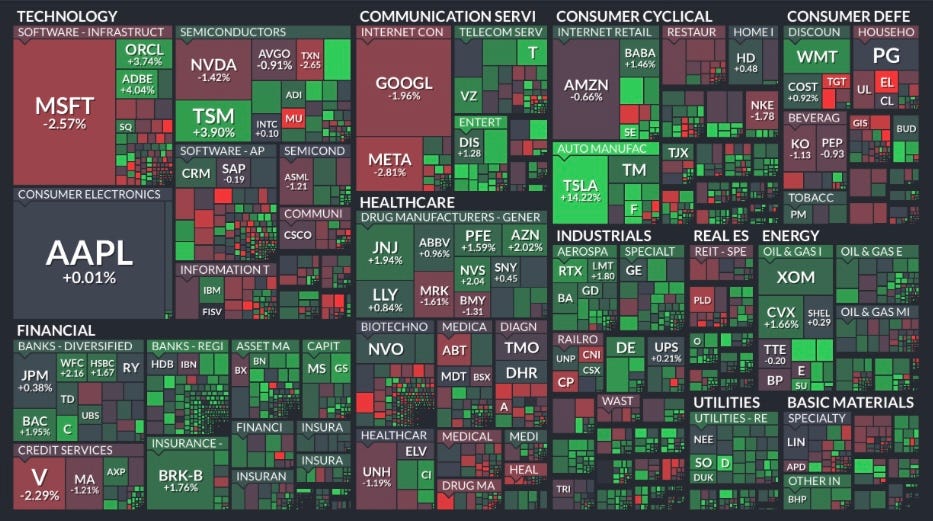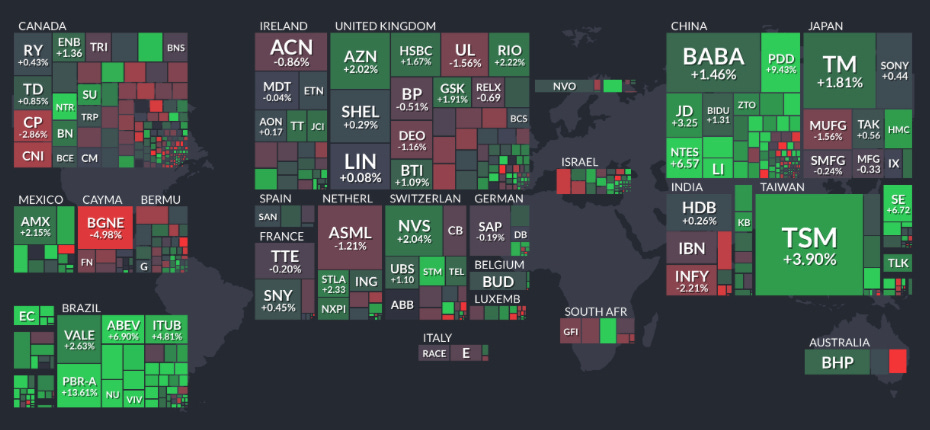📑 Research Notes for 2023-06-12
This week, we look at major central bank decisions, Saudi Arabia's production cut, and changes in the residential home market.
We conduct extensive investment research and share the most interesting content that we come across every week. Here is a curated list of this week’s top observations.
Do not reply to this email with any service requests, contact us for support if needed.
Last Week’s Market Performance Heatmap
🔗 Source
Central Banks Set to Announce Policies This Week.
This week is set to be busy for central banks, with the US Federal Reserve, Bank of Japan, and European Central Bank all announcing policies. The Fed is considering a potential pause in rate hikes, with some governors arguing that more data needs to be assessed before any further action is taken. The Dot Plot, which outlines economic projections, will also be revised. The Bank of Japan is unlikely to make any policy tweaks, despite higher-than-expected inflation. The European Central Bank is expected to announce more rate hikes, while the People's Bank of China is expected to maintain a stable policy stance.
🔗 Source
Saudi Arabia Pledges to Cut Oil Output by One Million Barrels a Day in Bid to Boost Prices.
Saudi Arabia has pledged to cut oil output by an additional one million barrels a day from July, taking its production to the lowest level in several years. The move comes after previous cuts failed to deliver a sustained price rally. The rest of the OPEC+ group offered no additional action but pledged to keep their existing cuts until the end of 2024. Oil prices have been hammered by a number of factors, including the softer economic outlook, especially in China. The near-term price is dependent on the test of wills between stability-seeking Saudi Arabia and bearish paper traders.
🔗 Source
US Homeowners Lose $5,400 in Equity in Q1 2021, but Average Home Equity Still High at $274,000: CoreLogic Report.
A new report shows that US homeowners have lost an average of $5,400 in equity in the first quarter of this year compared to a year ago. However, CoreLogic Chief Economist Selma Hepp notes that the decline is only marginal and that average home equity is currently at $274,000 per mortgage borrower, up almost $100,000 from pre-pandemic levels. Hepp also states that home prices are increasing again, with strong monthly gains in early spring, and that all markets are seeing pretty strong price gains once again. The decline in equity is more pronounced in Western states due to higher prices and affordability issues, while Florida's home price growth has remained elevated. Hepp notes that the current environment of low mortgage rates is recent and that people need to get further away from the three percent rate for them to start feeling comfortable again.
🔗 Source
Housing Bust Hits Small-Time Investors as Tenants Stop Paying and Eviction Bans Expire.
Thousands of small-time investors who bought rental homes after the housing crisis are facing a reckoning as tenants stop paying and eviction bans expire. Many of these investors are now struggling to pay their mortgages and property taxes, and some are being forced to sell their homes at a loss. The situation is particularly dire for those who bought homes in lower-income neighborhoods, where tenants have been hit hardest by the pandemic's economic fallout. Experts warn that the crisis could lead to a wave of foreclosures and further exacerbate the country's affordable housing shortage.
🔗 Source
Curated by Joseph Lu, CFA®
Joseph is the founder and managing director of Conscious Capital Advisors, and a CFA® Charterholder.
🔗 Connect with us on LinkedIn or Twitter.
Have a question about what we shared? Email us at info@consciouscapital.pro.
Do not reply to this email with any service requests, contact us for support if needed.
The information presented in this newsletter is for educational purposes only and is not a solicitation or recommendation for any specific security, product, service, or investment strategy.
Investments involve risk and unless otherwise stated, are not guaranteed. Be sure to consult with a qualified financial advisor, tax professional, or attorney before implementing any strategy or recommendation you may read here.






